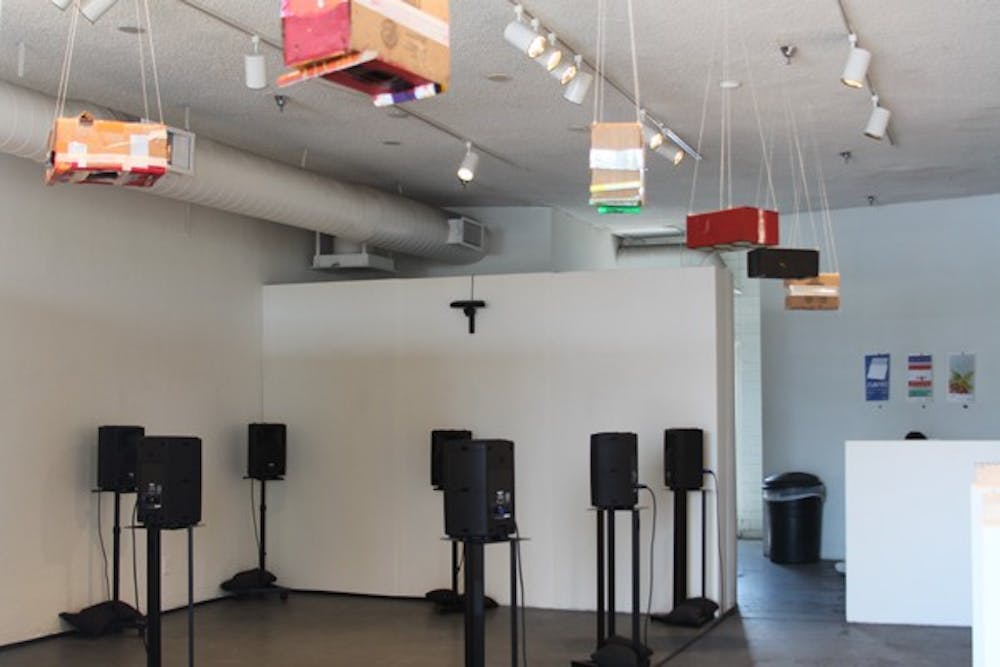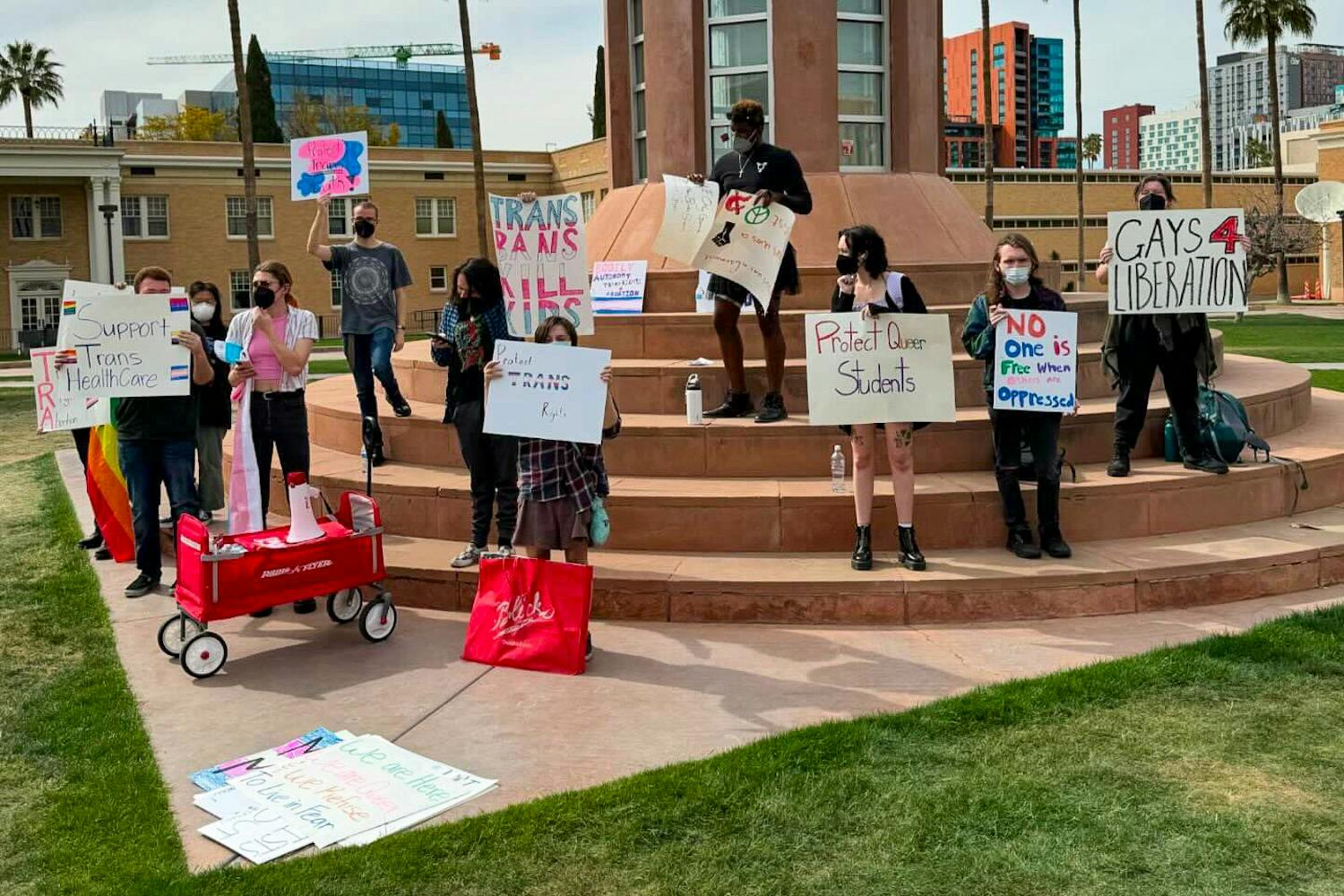 Una Casa de Sonidos is an interactive sound space that is appealing to all ages by Blake McConnell. The thesis exhibition show is open April 1-5 at ASU's Step Gallery located on 9th Street and Mill Avenue. (Photo by Ashley Kesweder)
Una Casa de Sonidos is an interactive sound space that is appealing to all ages by Blake McConnell. The thesis exhibition show is open April 1-5 at ASU's Step Gallery located on 9th Street and Mill Avenue. (Photo by Ashley Kesweder)Using his thesis project, a master of fine arts student helped minors who were brought illegally to the U.S. narrate their journey through art and sounds.
Blake McConnell, an arts graduate student with a concentration in digital technology, partnered with the Tumbleweed Center for Youth Development’s program Casa de Sueños to create a sonic story.
He worked with about 30 youths, aged 12 to 17, all of whom are in the custody of the U.S. Office of Refugee Resettlement, to make musical instruments and drawings that create an interactive soundscape.
McConnell’s thesis exhibition is on display at the Step Gallery in Tempe from April 1 to April 5.
The exhibition is made up of musical instruments created by the youth and drawings of the youth’s favorite places.
The instruments are all handmade and were created out of cardboard boxes, wooden boxes, markers, pencils and fishing lines, items which can be found in a classroom or household.
The exhibition also features an interactive soundscape that responds to visitor movements.
The soundscape is made up of eight speakers and a Microsoft Kinect for Xbox 360 sensor.
The Kinect sensor tracks a visitor’s movements and the speakers closest to the visitor emits sounds, which were created by the instruments the youth made.
McConnell said he came up with idea last semester but began working with the youth in January. The whole project took two and a half months.
He said at first, they had one five-hour weekly workshop but then split it into two to three sessions a week, so it was easier for the youth to handle.
During the workshops, McConnell said they worked on planning out the stories and creating visual scores, both in pairs and in groups.
He said most of the early stories were about journeys, but the theme turned to the youth’s favorite places and the sounds heard in those places.
Because many of the youth he worked with were illegally brought into the U.S. from Guatemala, Honduras and El Salvador, McConnell said there was a bit of a language barrier.
Despite this, he said working with the youth was a good experience, because they were able to learn from one another.
“I found the roles changed throughout the project,” McConnell said. “I often became the student, and they became the teacher.”
He said the project inspired one of the youth in the Casa de Sueños program to want to take what he learned back to his home country.
McConnell said although the participants in the program have lived difficult lives, they were resilient, cheerful and eager to learn.
“Something I wanted them to walk away with was they are valued,” he said. “After the project, they learned that their experiences meant something.”
Communications senior Martha Preciado said McConnell approached her at the end of last semester seeking an intern for the project.
Preciado worked as the translator, bridging the language barrier between the youth at Casa de Sueños and McConnell. She said translating on the spot was challenging at times, especially because of the audio terminology used.
“It was a bit difficult to translate words I didn't know, but overall it was a great experience,” Preciado said. “Though, I must say, it is 10 times easier translating something on paper than it is live.”
She said at times the youth weren’t fully invested in the project and that it was hard to grasp their attention and get them to focus. Although there were some difficulties, Preciado said the experience was interesting, because it was noticeable that from the beginning to the end of the project, the youth had become more open and familiar with both her and McConnell.
She said working on the project allowed her to gain hands-on experience, not only with translating but also with making contact microphones.
Preciado said the project opened new doors for the youth to different occupations with all the new skills they had acquired.
“The youth were very talented, and it was amazing watching them play the songs they created in the end,” she said.
Steven Serrano, Tumbleweed Center for Youth Development’s program manager, said McConnell was interested in incorporating his previous sound work and experience into the Casa de Sueños program. Although he wasn’t directly involved in the workshops, Serrano helped connect McConnell with the program, design the curriculum and monitor the interaction between all parties involved.
“I’m the connecting piece in the whole thing,” Serrano said. “We merged Blake’s sound work with Casa de Sueños and made a new program, a program unlike anything we had done before.”
He said working with the youth at Casa de Sueños can be a risk, because the outcome of these types of partnerships is uncertain, but in this case, it was successful.
Serrano said projects like Una Casa de Sonido are beneficial to the clients in the program because they are inspirational.
“Projects like this plant seeds,” he said. “It gives them a new set of eyes to look at the world.”
Reach the reporter at ppineda@asu.edu or follow her on Twitter @paulinapineda22




